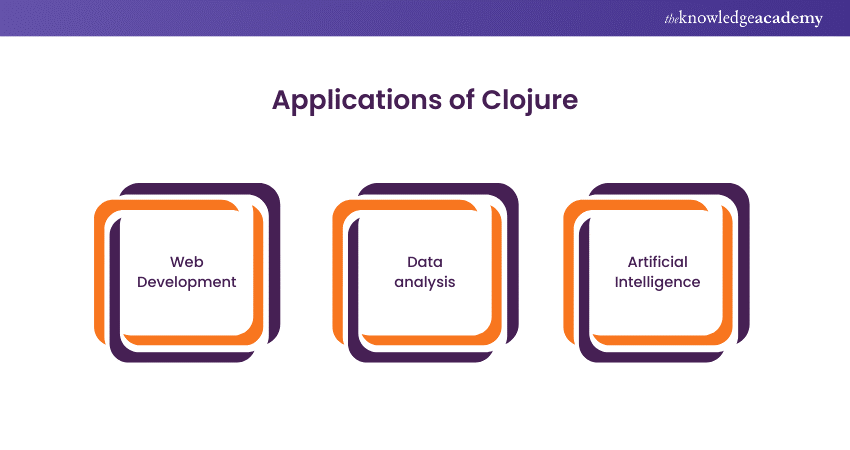We may not have the course you’re looking for. If you enquire or give us a call on +60 1800812339 and speak to our training experts, we may still be able to help with your training requirements.
Training Outcomes Within Your Budget!
We ensure quality, budget-alignment, and timely delivery by our expert instructors.

Embarking on a journey into the coding realm, let's delve into the question, "What is Clojure?" A paradigm-shifting language, Clojure blends simplicity with functional elegance. As we navigate its intricacies, we'll unravel the essence of this Lisp-based marvel, exploring why it captivates Developers and examining its profound impact on the programming landscape. In this blog, we will explore "What is Clojure?," why you might want to use it, how it works, and its pros and cons. We will also look at some of the applications of Clojure in various domains.
Table of Content
1) What is Clojure?
2) Reasons for embracing Clojure
3) How does Clojure Work?
4) Pros and cons of Clojure
5) Applications of Clojure
6) Conclusion
What is Clojure?
At its core, Clojure is a functional Programming Language that runs on the Java Virtual Machine (JVM). Developed by Rich Hickey, Clojure distinguishes itself by embracing simplicity and immutability. It is a member of the Lisp family, inheriting the power of macros and a minimalist syntax.
Understanding Clojure begins with acknowledging its roots. Lisp, a groundbreaking language from the 1950s, has heavily influenced Clojure. However, Clojure modernises these concepts for the contemporary Developer, offering a fresh take on functional programming.
Reasons for Embracing Clojure
You might want to use Clojure for your next project for many reasons. Here are some of the most common ones:
1) Simple and expressive
Clojure has a minimal and consistent core and a powerful and flexible syntax. Clojure programs are often concise and elegant and can express complex ideas with less code. Clojure also supports multiple paradigms, such as functional, object-oriented, logic, and concurrent programming, and allows programmers to choose the best tool for the problem.
2) Fast and scalable
Clojure runs on the JVM, a mature and high-performance platform offering a wide range of libraries and tools. Clojure also leverages the JVM’s garbage collection, JIT compilation, and optimisation features and can interoperate with Java code seamlessly. Clojure also supports parallel and distributed computing and can easily handle large amounts of concurrency and data.
3) Interactive and dynamic
Clojure supports interactive development, meaning programmers can evaluate and modify their code in a live environment and see the results immediately. Clojure also supports dynamic typing, which means that programmers do not have to specify the types of their variables and functions and can change them at runtime. Clojure also supports dynamic reloading, which means that programmers can update their code without restarting the application.
4) Pragmatic and innovative
Clojure is a practical and productive language that solves real-world problems. Clojure is also an innovative language that introduces new ideas and paradigms, such as transducers and core.async, spec, and datomic. Clojure is also a community-driven language with a vibrant and supportive ecosystem of libraries and frameworks.
How does Clojure Work?
Clojure is a functional Programming Language that runs on JVM. It has a Lisp-like syntax and supports macros, concurrency, and interop with Java. Clojure compiles its code into bytecode and executes it on the JVM. Clojure uses s-expressions, nested lists of symbols and literals to represent code and data. Clojure evaluates s-expressions according to certain rules, such as symbols being looked up in the environment, literals being returned as themselves, and lists being treated as function calls. Clojure also has immutable and persistent data structures, such as vectors, maps, sets, and lists, that can be manipulated with pure functions.
Embark on a journey of Java mastery – Join now and code the future with our comprehensive Java Programming training.
Pros and Cons of Clojure
Clojure is a functional Programming Language that runs on JVM. It has many pros and cons that you should consider before using it.
Pros of Clojure
Clojure's strengths lie in its simplicity, expressiveness, and conciseness. The minimalist syntax makes code elegant and readable. The emphasis on immutability fosters robust and scalable systems. The integration with Java allows access to a vast ecosystem of libraries and tools.
Real-world success stories abound, showcasing how Clojure has been instrumental in solving complex problems efficiently. Its adaptability in various domains, from web development to concurrent programming, positions it as a versatile tool in the Developer's arsenal.
Cons of Clojure
While Clojure has its merits, it's essential to address its challenges. The learning curve can be steep, especially for Developers accustomed to imperative languages. The community, though passionate, might not be as extensive as that of more mainstream languages. Additionally, the lack of native support for some features may pose initial hurdles.
|
Pros of Clojure |
Cons of Clojure |
|
Simplicity, expressiveness, and conciseness |
Steep learning curve for Developers used to imperative languages |
|
Minimalist syntax for elegant and readable code |
Limited community compared to more mainstream languages |
|
Emphasis on immutability for robust and scalable systems |
Lack of native support for some features |
Applications of Clojure
Clojure can be used for various applications, such as:

a) Web development: Clojure has many libraries and frameworks for building web applications, such as Ring, Compojure, Luminus, and Pedestal. Clojure also supports web development on the client side through ClojureScript, a compiler that targets JavaScript.
b) Data analysis: Clojure has a rich set of immutable, persistent data structures, such as vectors, maps, sets, and lists, that can be manipulated with pure functions. Clojure also supports lazy sequences, which are collections computed on demand. Clojure can easily handle large amounts of data and concurrency and can interoperate with Java libraries for data processing, such as Apache Spark and Hadoop.
c) Artificial Intelligence: Clojure can be used for Artificial Intelligence applications, such as Natural Language Processing, Machine Learning, Computer Vision, and Logic Programming. Clojure has libraries and frameworks for these domains, such as core.logic, core.matrix, clojure-opennlp, and cortex. Clojure also supports interactive development, which allows programmers to modify and test their code in a live environment.
Dive into the elegance of functional programming – Join now for Clojure Programming Language Training and craft resilient, expressive code that stands the test of innovation.
Conclusion
In conclusion, the enigma of “What is Clojure?” unfolds as a language transcending convention. Its concise syntax, functional prowess, and versatile applications redefine how we approach software development. Clojure stands as a testament to the evolution of Programming Languages, inviting Developers to embrace a world where simplicity and effectiveness converge, leaving an indelible mark on the ever-evolving landscape of technology.
Transform your code into career success with our Programming Training – where skills are honed, challenges are coded, and futures are programmed.
Frequently Asked Questions

Clojure is a functional, dynamic, and expressive language that runs on multiple platforms like Java, JavaScript, and .NET. Clojure allows programmers to write concise and elegant code that can leverage the existing libraries and frameworks of the host platforms. Clojure also supports concurrency, immutability, and data-oriented programming, which is essential for developing robust and scalable applications.

One of the easiest ways to get started with Clojure programming is to use Clojure’s REPL (Read-Eval-Print Loop). This interactive environment lets you type and evaluate Clojure expressions. You can access the REPL online or install it locally. You can also use an IDE or an editor that supports Clojure, such as Emacs, Vim, VS Code, IntelliJ IDEA, etc.

Clojure is a general-purpose language for various domains and applications, such as web development, data analysis, Machine Learning, Artificial Intelligence, distributed systems, etc. Some popular projects and companies that use Clojure are Datomic, a distributed database system; Metabase, a business intelligence tool; Nubank, a digital bank; and Netflix, a streaming service.

The Knowledge Academy takes global learning to new heights, offering over 30,000 online courses across 490+ locations in 220 countries. This expansive reach ensures accessibility and convenience for learners worldwide.
Alongside our diverse Online Course Catalogue, encompassing 17 major categories, we go the extra mile by providing a plethora of free educational Online Resources like News updates, blogs, videos, webinars, and interview questions. Tailoring learning experiences further, professionals can maximise value with customisable Course Bundles of TKA.

The Knowledge Academy’s Knowledge Pass, a prepaid voucher, adds another layer of flexibility, allowing course bookings over a 12-month period. Join us on a journey where education knows no bounds.

The Knowledge Academy offers various Programming Training including Python courses, R programming courses and Java Training. These courses cater to different skill levels, providing comprehensive insights into Programming methodologies.
Our Programming Blogs cover a range of topics related to Java and Python, offering valuable resources, best practices, and industry insights. Whether you are a beginner or looking to advance your Programming skills, The Knowledge Academy's diverse courses and informative blogs have you covered.

The Knowledge Academy’s FlexiPass is a pre-paid training voucher that is built specifically for clients and their dynamic needs. It provides access to a wide range of courses at a pre-determined price, with robust safety measures. FlexiPass gives clients the added benefit of upskilling on a budget that best fits them.
Upcoming Programming & DevOps Resources Batches & Dates
Date
 Clojure Programming Language Training
Clojure Programming Language Training
Fri 28th Mar 2025
Fri 23rd May 2025
Fri 4th Jul 2025
Fri 5th Sep 2025
Fri 5th Dec 2025







 Top Rated Course
Top Rated Course



 If you wish to make any changes to your course, please
If you wish to make any changes to your course, please


